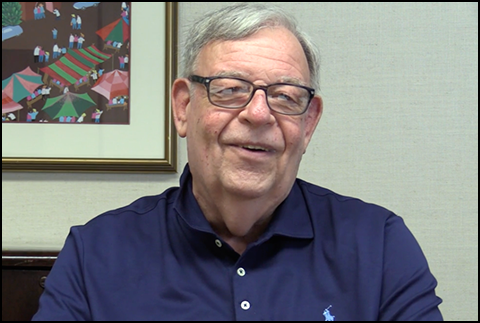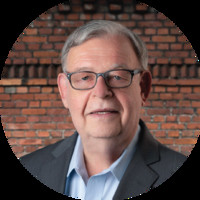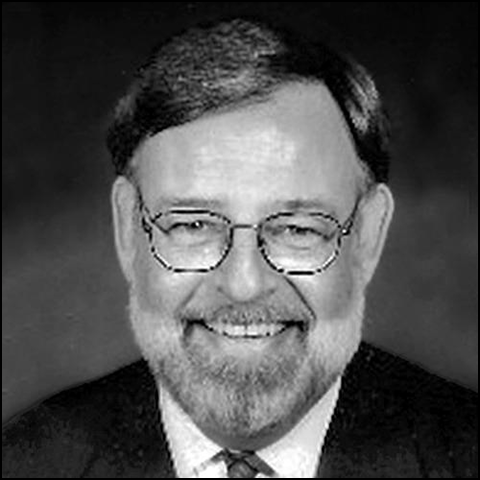April Third Movement
Paul Eugene Rupert

The following is excerpted from an article by Richard Lyman, published in the Stanford Magazine, January/February, 1969:
[Early in 1969,] Students for a Democratic Society (SDS) kept pressing for an open meeting of the Board of Trustees to explain their involvement in Southeast Asia, a proposal that met with no enthusiasm from the trustees. When a body called the University Advisory Committee, consisting of student, faculty and trustee members, invited the board to send five of its members to an open forum on campus, the stage was set for what turned out to be a sudden change in the climate. The session was scheduled for two hours on the afternoon of March 11.
Paul Rupert [’67], a member of the Resistance and of the United Campus Christian Ministry, summed up what happened exultantly: “Five powerful and legitimate trustees came before the people they ruled, most of whom were trying to keep an open mind. . . . But by the meeting’s end, the rulers had lost control of their audience, and the people were demanding an open meeting.”
Leaving aside phrasing like “the people they ruled,” this was an accurate summation, and Rupert was a major contributor to the outcome, opening the session with a blistering attack on the trustees for subordinating the true educational aims of the University to the economic interests of the corporate world whence they came.
What soon became clear to a sophisticated listener was that the trustees had absolutely no experience that would prepare them for this, or for the torrent of hostile questions that followed. They were not people accustomed to examining, much less defending effectively, the assumptions that underpinned their lives. Assertions that the University was involved in the war, on the wrong side, left Bill Hewlett [’34, Engr. ’39] puzzled. “Stanford University is an organization of the United States. . . . It is not a South Vietnamese organization.”
When Great Trees Fall
A memorial service was held for Paul in the Garden of Remembrance Memorial Park in Clarksburg, Maryland, on January 26, 2024. Paul’s wife, Robyn Lipner, read a poem by Maya Angelou, When Great Trees Fall. It reflects what Paul meant to her, to her family, and to many others. A video recording of the service is available on the StreamSpot cloud. Link
When Great Trees Fall is available at poems.com. Link
The Movement Oral History Project
Paul participated in The Movement Oral History Project and was interviewed on May 5, 2019, by Natalie J. Marine-Street. When she learned of his passing, she told us, So sorry to hear about Paul. I was privileged to conduct his oral history. I think about it often.
The video has two parts. Both can be accessed by clicking on the three-line icon in the upper left. A transcript also is available. Video Link. Transcript Link.
KPFA Radio Station Recording
KPFA, a community supported radio station in Berkeley, broadcasted a discussion featuring Paul Rupert, Fred Cohen, Mary Hanson, and Margie Cohn; and played a tape of the March 11, 1969 Trustee forum. A portion of that recording is available on the A3M Web site. LinkAllan Wernick
During AEL, the SPS poohbahs told us to go to our classes and suggest that they be held at AEL. I dutifully did so, and the professor let the class vote and we agreed to go to the lab. The prof asked me if I could get someone to speak to the class and I asked Paul. He came right over. The prof was VERY impressed that I got the legendary Paul Rupert to speak to us. What a great guy he was.
Lenny Anderson
Paul was a beacon for a lot of us, trying to navigate life with some honor and meaning in a country at war. He will be missed by all his life have touched. My condolences to his family.
For a decisive time of our lives Paul and I were close, shared values, battles, and friends in the Bay Area from the late 60’s into the 80’s. I met Paul at the University of Chicago where he was doing graduate work at the Divinity School while I worked to finish up my undergraduate degree in 1967-8. The draft was bearing down on us both; he was resisting and organizing!
As it turned out I got a grant for graduate work at Stanford, and he returned as well to Palo Alto. When I arrived in the fall of ‘68, I crashed on his couch.
I turned in my draft cards in the winter of ‘69 and joined the Draft Resistance of which Paul was a key leader. We worked together through that spring as the A3M movement occupied the Applied Electronics Lab and galvanized the campus in opposition to the Vietnam War. More actions followed, arrests, brainstorming sessions, potluck dinners and all manner of life’s doings.
That summer the Palo Alto Draft Resistance received funds for the purchase of a printing press; it was installed at the Liberation Press in Palo Alto, an operation owned by the Mid-Peninsula Free University. Training began on its operation, and the young member of our group assigned to operate it was not up to the task, and I stepped in and assumed the job. Paul and I worked together on a number of publications which he co-wrote, and I printed, including a pictorial history of the Mid-Peninsula.
I moved to San Francisco in 1970, after spending part of my summerselling ice cream at outdoor concerts at Stanford to raise money for the medical clinic in Redwood City that Paul was organizing. By that time, he had been banned from neighboring Santa Clara county due to his political activism. He later moved to SF, and our paths continued to cross over the years. My last memory was his helping me to load a U-Haul trailer in Santa Rosa, CA in the summer of ‘86 after my wife and I pulled up stakes to move to Portland, OR.
Years later, while flying across the country on a work trip, I saw an article in the airline magazine about workplace issues written by “Paul Rupert,” and wondered is this my old friend? It was, as I later learned that he continued to fight in his organized and informed way for a better world, one workplace at a time.
Denis Hayes
I've been talking with Paul every few weeks for the last six months, mostly about politics and the 2024 elections, but also about climate disruption, nuclear proliferation, the backlash against our values, etc. He was clear-eyed about his personal expiration date, but always searching for new ways to have leverage. His infectious enthusiasm remained strong to the end.
Sue McKevitt
Denis. Like you I’ve been talking with Paul for the past two years and he told me how pleased he was to be connected with you. He so valued the long-term friendship and of course the social/political engagement that you, he and so many more have kept up over the years. Just thought I would share that little tidbit with you. You made him smile.
 And here is our Paul, sans his beard. It’s from his web site. I found a nicer one of him, smiling, but I can't seem to be able to copy it.
And here is our Paul, sans his beard. It’s from his web site. I found a nicer one of him, smiling, but I can't seem to be able to copy it.
I woke this morning remembering a story Paul told me a while back in one of our many almost weekly conversations. I had asked him what ruined his kidney (at that point he had one out and one in). I have a friend whose daughter was born with only one, so I was curious. Paul and I did lots of kidney talk in addition to politics. (She had a successful transplant last year and is now 49 and healthy!) Here is what he said.
Back in the day he felt something was wrong with him and being who he is/was, he did lots of medical research and after a while self-diagnosed that he was bi-polar. He researched the medicine available (at the time) and went to a medical facility to have a psychiatrist order him what he needed. At the reception desk, the attendant refused to let Paul see the doc. and suggested some way in the future appointment. Paul wouldn’t hear from that and after many refusals of the attendant to let him see the doc, Paul calmly said: “See that parking lot there (they were on the ground floor with big windows)? See that car? That’s my car. If you don’t let me see the doc, I’m going out there, getting into that car and crashing it thru these fu*king windows!” (He and I had a very good laugh at that one.) The attendant immediately called the upstairs doc and Paul went up to see him. After lots of questions, which Paul suffered thru a bit annoyed as he already had done what the doc was doing and of course, the doc finally came to the same conclusion. At that point, the doc wrote a prescription for lithium, the then medicine for bi-polar disease. It was years later, when Paul’s first kidney was acting up that the then kidney doc (who he grew to really appreciate and respect) asked if he was on lithium and upon hearing yes, for years, the doc immediately told him to stop taking it and gave him something else. Alas, the damage was done. The lithium ruined his kidney, so it needed to come out. Paul was on a wait list for a kidney transplant for about 3 years if I recall correctly (my friend’s daughter was on one for 6 years). Turns out, his son David, living in Australia, was a perfect match and was willing to donate. While waiting for medical clearance to do the transplant, it was discovered that Paul’s remaining kidney was cancerous, so it too needed to go. The rest, as they say, is history.
Paul’s body gave out way before his spirit ever could. We shared lots of other stories, from back in the People’s Medical Center days where we met (I was Sue Flores then), to our kids, philosophizing about life, always politics, his interest in going back to school to get his divinity degree and shake up the religious community, his love and admiration for so many from the early days with draft and ecology leaders, the weather, where to focus his energy in organizing, laughing at the absurdity of things, and always remaining strong in both of our hearts that we will survive this most awful bump in our collective history. To me that is his most endearing legacy. He believed we would/will make it. Even in these horribly dark times, he looked for and found the light and went towards it, to support and grow it. Neither of us knew/know what that future would/will look like, but it didn’t/doesn’t matter. We agreed, it’s for the next generation to create the next phase of our evolution into the more compassionate and beloved community we all hold so dear. Our role is to support them however we can to bring it into being.
These are some morning reflections on a wonderful person. What a gift to have had him in our lives.
Peace,
Sue McKevitt
Mark Paul
Sad news. Paul was my sponsor in Rinconada when I arrived in ‘66 as a freshman, a Republican Presbyterian kid from the Midwest. He combined warmth, intelligence, humor, and empathy in ways I had never seen in my pastors or the leaders of the Christian camp I attended. Knowing him changed the trajectory of my life. RIP, Paul.
David Schilling
Colleagues, So glad to know that Paul has died, though it is hard for me to think of Paul no longer in this world. I worked closely with Paul in 1968 and 69 when I was Assistant Dean of the Chapel and Paul was working half time at the United Campus Ministry. He was the person who got me involved with the April 3rd Movement...a powerful mentor to me. I was thrilled to reconnect with Paul at the 2019 reunion where we caught up and then had some wonderful phone calls. I miss him and his capacity for engaging so many people to take action!
Dave Ransom
Paul—Who put on a clerical collar to get in to visit Dee McGuire in the county jail.
Alan Ramo
Paul was truly inspirational. He made the moral choice sound so reasonable, indeed the only choice.
David Schlissel
Alan said it best about Paul. That’s how I felt about him from 68 until now
Marjorie Cohn
I remember when Paul would hold court in his dorm room. He had written wonderful things in a spiral on the ceiling. He was so smart and kind and wise. I am grateful to have known him.
Hal Hamilton
I looked up to Paul. He and David Harris each had a sort of grace and wisdom, along with determination. Paul also had humility and wry humor. Once I asked a colleague how one chooses a teacher, and he said, “Find someone with deep roots.” That was Paul.
Kent Hudson
David spoke of Paul admiringly from the earliest days of the Resistance when we were at Cooley St and setting up the printing press. For years afterwards and until David's death, almost each time we saw each other, Paul was in the discussion. I regret not having known Paul more deeply.
James Shoch
Ditto to everything people have said about Paul, especially his moral core and his generosity. As we all recall, his ability to inspire others was remarkable. He pulled me into some of my first political activities, including leafleting on White Plaza for a radical economics forum and writing for the Resistance newspaper, the Plain Rapper. We kept in touch some during our mutual San Francisco days in the 70s and 80s where he worked on GI and community dispute resolution issues. He grappled with some tough mental health problems for a while but came out the other end. A great organizer and a wonderful human being.
Molly Dougherty
Just had a chance to catch up with all your wonderful posts about Paul. I took a UCM course from him the fall of my freshman year (1968) -- I think it was about liberation theology—which profoundly influenced me and led to my involvement with the A3M. To watch him skewer the Stanford Trustees at that famous meeting was inspirational.

Interview with Paul Rupert: The Movement Oral History Project,”
Stanford Historical Society, Stanford Libraries, May 5, 2019. Link
Rupert Organizational Design, rupertdesign.com. Link
At the Hands of the Radicals,
by Richard Lyman, Stanford Magazine, January/February, 2009, excerpted from Stanford in Turmoil: Campus Unrest, 1966–1972, by Richard Lyman, Stanford University Pres, 2009. Link
